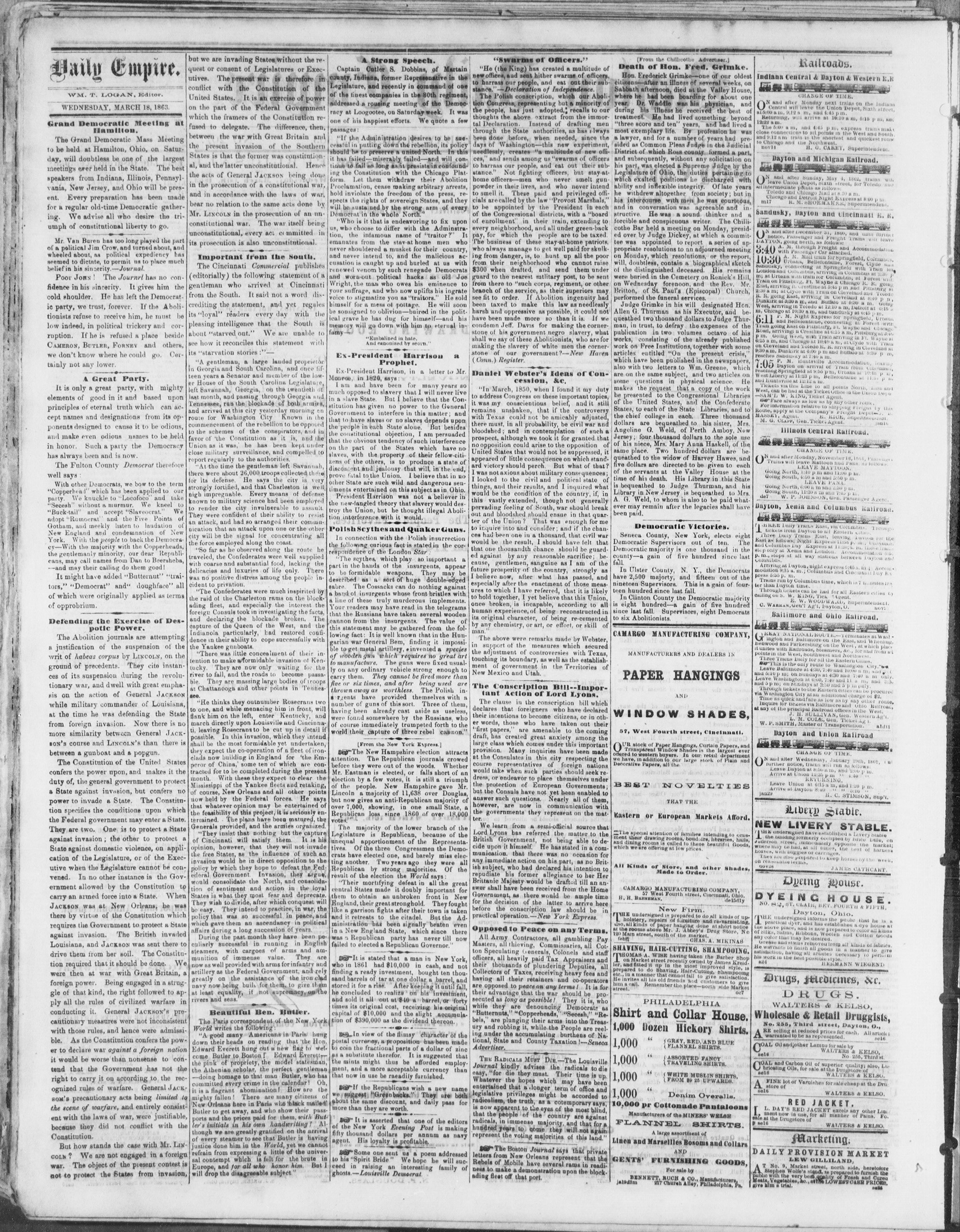Dayton Daily Empire, March 18, 1863

The Dayton Daily Empire was founded circa 1844 and also was issued as the Evening Empire, the Weekly Empire, and the Tri-Weekly Empire. In 1860, ownership of the newspaper was passed to the I. R. Kelly & Company and John Frederick Bollmeyer. Following the murder of Bollmeyer in 1862, his assistant William T. Logan took over the newspaper.
Transcript
From “Defending the Exercise of Despotic Power”
The Abolition Journals are attempting a justification of the suspension of the writ of habeas corpus by Lincoln, on the ground of precedents. They cite instances of its suspension during the revolutionary war, and dwell with great emphasis on the action of General Jackson while military commander of Louisiana, at the time he was defending the State from foreign invasion. Now there is no more similarity between General Jackson’s course and Lincoln’s than there is between a gunboat and a popgun.
The Constitution of the United States confers the power upon, and intakes it the duty of, the general government to protect a State against invasion, but confers no power to invade a State. The Constitution specifies the conditions upon which the Federal government may enter a State. They are two. One is to protect a State against invasion; the other to protect a State against domestic violence, on application of the Legislature, or of the Executive when the Legislature cannot be convened. In no other instance is the Government allowed by the Constitution to carry an armed force into a State. When Jackson was at New Orleans, he was there by virtue of the Constitution which requires the Government to protect a State against invasion. The British invaded Louisiana, and Jackson was sent there to drive them from her soil. The Constitution required that it should be done. We were then at war with Great Britain, a foreign power.Being engaged in a struggle of that kind, the right followed to apply all the rules of civilized warfare in conducting it. General Jackson’s precautionary measures were not inconsistent with those rules, and hence were admissible. As the Constitution confers the power to declare war against a foreign nation it would be worse than nonsense to contend that the Government has not the right to carry it on according to the recognized rules of warfare. General Jackson’s precautionary acts of being limited to the sense of warfare, and entirely consistent with the laws of war, were justifiable, because they did not conflict with the Constitution.
But how stands the case with Mr. Lincoln? We are not engaged in a foreign war. The object of the present contest is not to protect the States from invasion, but we are invading States without the request or consent of the Legislatures or Executives. The present war is therefore in conflict with the Constitution of the United States. It is an exercise of power on the part of the Federal Government which the framers of the Constitution refused to delegate. The difference, then, between the war with Great Britain and the present invasion of the Southern States is that the former was constitutional and the latter unconstitutional. Hence the acts of General Jackson being done in the prosecution of a constitutional war, and in accordance with the laws of war, bear no relation to the same acts done by Mr. Lincoln in the prosecution of an unconstitutional war. The war itself being unconstitutional, every act committed in its prosecution is also unconstitutional.
Questions:
What is the stance of the writer on President Lincoln’s suspension of habeas corpus?
What evidence does the writer use to support the claim?